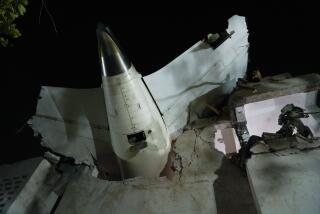Wall St. Takes Boeing CEO’s Ouster in Stride
- Share via
Wall Street has mostly yawned since Boeing Co. dismissed its chief executive for having an extramarital affair with a company executive.
Instead of plummeting, the stock has hovered near its three-year high. Whomever Boeing names to succeed Harry C. Stonecipher will inherit a company in its strongest financial position in years.
“For the government and airline customers, this was just an unfortunate misstep,” said Richard Phillips, vice president of the aerospace and defense group for investment banker Houlihan Lokey Howard & Zukin. “It’s more of a public image problem for Boeing” than a financial one.
On Monday, after Stonecipher’s forced resignation was announced, Boeing shares fell 8 cents below Friday’s 3 1/2 -year high of $58.38. On Tuesday, they slipped 15 cents to $58.15 on the New York Stock Exchange.
The airplane maker and defense contractor took pains to note that it was in sound financial shape. “This announcement has no impact or will have no impact on our outlook,” James Bell, the interim CEO, told analysts Monday. “Our financial performance in 2004 was strong, and we have projected significant growth in our businesses over the next two years.”
Separately, BusinessWeek and the Wall Street Journal identified the woman with whom the married Stonecipher was having an affair as Debra Peabody, vice president of operations and commercial activities in the company’s Washington office.
Citing anonymous sources, BusinessWeek said Peabody, 48 and unmarried, met Stonecipher in January at Boeing’s annual executive retreat at the Mission Hills Country Club in Palm Desert.
According to biographical information on the website of the University of Washington Business School and other sources, Peabody joined Boeing in 1980 as an engineer and rose to become a sales director for commercial airplanes in London and then later international sales director for Boeing’s broadband Internet service before she was named to manage the office operations of the company’s Washington government relations office. She received a business degree from the University of Washington in 2003. Peabody could not be reached for comment.
A company source said Boeing posted a statement on its internal website Tuesday that said it was still investigating the female executive’s actions. The statement was posted after a number of employees questioned why Peabody remained with the company while Stonecipher was dismissed.
One reason for Boeing’s upbeat forecast is that the company is no longer so dependent on jetliner sales. A decade ago, it diversified into the defense business, which now accounts for 60% of revenue, and Pentagon contracts are expected to keep rising at a robust rate.
Many analysts noted that sales of Boeing commercial jets, particularly overseas, were growing again after a three-year slump. Virtually all financial analysts that cover Boeing kept their recommendations unchanged after Stonecipher’s departure.
Although Europe’s Airbus has surpassed Boeing as the world’s biggest commercial plane maker, Boeing last month revised its outlook for this year, saying it expected to make 375 to 385 airliners in 2006, up from 320 this year and 285 in 2004.
Commercial airplane sales account for 40% of Boeing’s revenue, down from 60% five years ago. But the mix could flip-flop again with the current uptick in commercial aircraft orders.
On Tuesday, Boeing said Air France ordered four twin-aisle 777-300 jets with a listed value of about $920 million. And Boeing conducted the first test flight for its longest-range jet, which could fly about 10,000 miles nonstop. The modified 777-200LR is expected to enter service in 2006.
Meanwhile, Boeing engineers in Seattle are finishing up the final designs for the 787, a highly fuel-efficient jet that will start operating in 2008. The aircraft, with about 250 seats and made mostly of lightweight composite materials, will be Boeing’s first new jet in a decade.
The recovery in commercial aircraft sales comes as the Pentagon looks to slow spending on weapons, but Boeing believes its defense revenue will continue to grow for several years as it fulfills a massive, $84-billion backlog.
Boeing is the so-called lead systems integrator for the Army’s Future Combat Systems, a complex $100-billion, decades-long program to develop a network of new weapons. The company won the contract, initially worth $14.6 billion, two years ago and has about 2,000 engineers in Southern California designing the system, developing new manned and unmanned vehicles on the ground and in the air that would be connected by an Internet-like network.
Meanwhile, the ethics scandals that have dominated the company for the last two years appear be waning. On Friday, the Air Force reinstated Boeing so it could bid once again for rocket orders.
Boeing was suspended after federal investigators found that two former Boeing employees stole proprietary documents from a rival.
Some analysts cautioned that a prolonged search for Stonecipher’s successor could weigh down the stock and could unravel much of the progress he had made by aggressively marketing Boeing’s jets.
More to Read
Inside the business of entertainment
The Wide Shot brings you news, analysis and insights on everything from streaming wars to production — and what it all means for the future.
You may occasionally receive promotional content from the Los Angeles Times.









